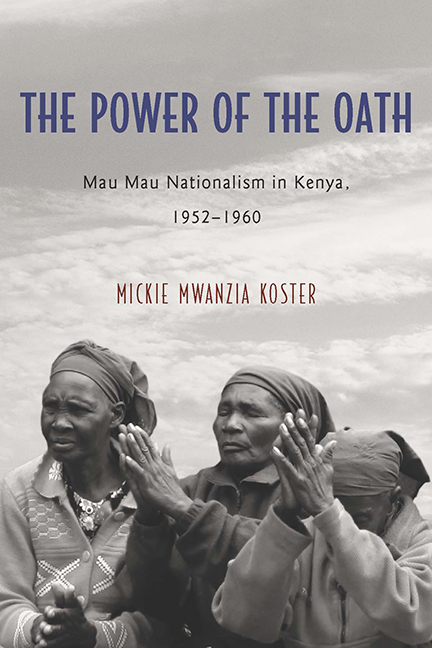Summary
I took the Mau Mau oath.
I was told that if I was to tell anyone about this
I would be killed.
—Maingi Johanna, August 5, 1954Oathing is a source of power in many African communities. Throughout history, oathing has been a way to establish justice. Many believe in and remember the power of the oath. Born in 1922, Mutunga Kateta from Muumandu, Machakos, explains this phenomenon, “It [the oath] was a belief; something sacred passed down from the Gods themselves. People could die, go mad, be maimed or even it could be silent for a long time and surface in another generation.”
During Mau Mau, the oath was invoked as a secretive and feared power source used to seal the movement and restore justice. There were many injustices leading up to Mau Mau. Under colonial rule, African pleas for political inclusion, failed promises, and ignored economic grievances went unaddressed. Between 1952 and 1960, thousands of African men and women vowed secrecy, unity, and allegiance to the Mau Mau movement to fight British hegemony. Their oath words, acts, and statements were a ceremonial mix of old and new practices. The Mau Mau oath was already invoked when on October 20, 1952, Sir Evelyn Baring, the governor of the Kenyan Colony, declared a State of Emergency.
The memory and testimonies of veteran freedom fighters provides a fresh account of Mau Mau, the goals, and the spread of the movement. Mau Mau veteran James Mutua Malei, born in 1936 in the village of Nduu in Machakos, gave his testimony in 2009. He reveals movement and oath questions of when, where, why, and how, along with the significance of his Mau Mau participation:
I took the Mau Mau oath three times. The first oath was done at Kariobangi in Nairobi in 1952 where the Mau Mau killed and buried people in the slums. The second time was in 1953 in Eastleigh in a house. And the third was at Kinangop in a forest near Sasumua Dam. I took the oaths because it was to liberate the black man. We no longer wanted to bow down to whites, but to govern ourselves. The Mau Mau meant unity. The oathing ritual involved removing our clothes when we arrived at the oathing location.
- Type
- Chapter
- Information
- The Power of the OathMau Mau Nationalism in Kenya, 1952–1960, pp. 1 - 16Publisher: Boydell & BrewerPrint publication year: 2016

